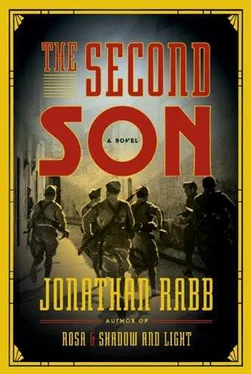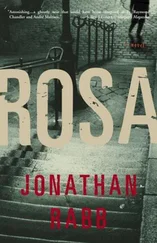Jonathan Rabb - The Second Son
Здесь есть возможность читать онлайн «Jonathan Rabb - The Second Son» весь текст электронной книги совершенно бесплатно (целиком полную версию без сокращений). В некоторых случаях можно слушать аудио, скачать через торрент в формате fb2 и присутствует краткое содержание. Жанр: Политический детектив, на английском языке. Описание произведения, (предисловие) а так же отзывы посетителей доступны на портале библиотеки ЛибКат.
- Название:The Second Son
- Автор:
- Жанр:
- Год:неизвестен
- ISBN:нет данных
- Рейтинг книги:4 / 5. Голосов: 1
-
Избранное:Добавить в избранное
- Отзывы:
-
Ваша оценка:
- 80
- 1
- 2
- 3
- 4
- 5
The Second Son: краткое содержание, описание и аннотация
Предлагаем к чтению аннотацию, описание, краткое содержание или предисловие (зависит от того, что написал сам автор книги «The Second Son»). Если вы не нашли необходимую информацию о книге — напишите в комментариях, мы постараемся отыскать её.
The Second Son — читать онлайн бесплатно полную книгу (весь текст) целиком
Ниже представлен текст книги, разбитый по страницам. Система сохранения места последней прочитанной страницы, позволяет с удобством читать онлайн бесплатно книгу «The Second Son», без необходимости каждый раз заново искать на чём Вы остановились. Поставьте закладку, и сможете в любой момент перейти на страницу, на которой закончили чтение.
Интервал:
Закладка:
While Georg found another safe nook, a General Goded was arriving by seaplane from Majorca. He had been told to take the city for the rebels. He wasn’t counting on the Guardia Civil joining the workers, a column of four thousand men, eight hundred of whom were climbing the Via Laietana toward the Commission of Public Order. The crowds roared, rifles and fists reached to the skies, and the Republican fighters-with some crack sniper fire-retook the Ritz and the Colon, while the anarchists overran the telephone exchange. And all this by 2 p.m. It was now just a matter of time before the fascists were done for.
4 p.m. Only a few pockets left. Hard to think I would have been up in the stadium right now, seeing flowers and doves and hearing anthems for the games. It’s unimaginable.
I’m in the Avenida Icaria, down near the water. They’ve turned huge rolls of newsprint into barricades. It’s keeping the fascist regiment from the Sant Andreu barracks back. The other rebel soldiers are cut off.
There was a moment of remarkable bravery a few minutes ago. A rebel machine gun was wreaking havoc. Two workers stepped out from behind the barricade and, raising their rifles over their heads, began to walk toward it. It was startling to watch from the barricade. It must have been even more so at the machine gun, because the firing stopped. The two workers shouted to the rebels that they were firing on their brothers.
“Your officers have tricked you!” one of them shouted. “You must fight for Spain, not against her.”
They continued walking, rifles over their heads. A minute later, the rebel soldiers turned their machine gun around and began to fire on the fascists. It was-I don’t know what it was. The rebels surrendered a minute later.
It gives me hope.
Two hours later, General Goded admitted defeat on the radio and was promptly shipped off to face court-martial. So ended the first full day of civil war in Barcelona. Six hundred lay dead, four thousand wounded.
As for the People’s Games, Spain was well beyond games.
After that, there were no more letters from Georg. There was nothing more from Georg. Nothing.
And his silence headed east.
2
“You’re a Jew, then?”
Pimm was dead. It was six months since they had pulled the body from the water, a single shot to the back of the head. Several of his boys had been posted to the usual spots where things tended to float up-down by the grain mills, or along the little inlet just beyond the Oberbaum Bridge-but it had taken almost a week before one of them had spotted him.
Not that it should have come as a shock. Run with the syndicates, swim in the Spree. That was the old line, and even bosses weren’t immune. Tach and Wetzmann had been idiots back in 1916, trying to horn in on Pimm’s hold on the Turkish sugar market. What had they expected? Both had ended up bobbing against the rocks. Still, the Spree was usually reserved for ratchet-and-pick men or a sloppy garrote. Bosses usually got better.
Things had changed, though. They had changed, and the world had watched and applauded or turned away, or whatever the world does when these things happen. The new boys wanted things cleaned up-they were very keen on cleaning-and criminals were an easy target.
“Herr Hoffner?”
Kriminal-Oberkommissar Nikolai Hoffner looked back across the desk. He was finding his mind wandering these days-to Pimm, to Martha, even to Sascha-especially when the windows were so tall and the sky beyond such a nice clean gray. The office was a throwback to the Kaiser’s Berlin, a vast hall with two-story drapes held tightly among the rococo swirls of gold inlay that followed the moldings up and around. Above, someone’s idea of an Arcadian romp filled the ceiling and spilled down onto the upper reaches of the walls, although even the little cherubs seemed smart enough not to stray too far down. A portrait of Hitler hung behind the desk: best to remain out of the Fuhrer’s gaze.
Hoffner refused to look at the file on the desk. Not that he was much on reading things upside down, but he knew it was the expected response. Why give this Herr Steckler the pleasure?
Hoffner corrected him. “It’s Chief Inspector Hoffner.”
Steckler continued to scan the pages. “Yes.” He looked up. “So you’re a Jew?”
It was impressive how Steckler had waited this long to ask, the small spectacled face doing its best at indifference, though mocking it all the same. These days it was where things always began or ended: Jew, the calling card of bureaucracy. This one, however, was shaking things up, slipping the question in at the middle.
“Technically,” said Hoffner. “Yes.”
Steckler returned to the pages. “It’s a world of technicalities now, isn’t it?”
Hoffner said nothing.
“And to have it go unnoticed for over three years,” Steckler added. “Remarkable.”
The Nazis had passed the Berufsbeamtengesetz in April of 1933, the Law for the Restoration of the Professional Civil Service-a clever little piece of legislation to weed out the Jews and the Communists.
Steckler continued to read. “Your mother. She was a Jewess. Ukrainian.”
“She converted,” said Hoffner. “To Lutheranism.” It might have been Methodism-Hoffner had never known which-but why burden Steckler with the details.
“But not before you were born,” said Steckler.
“No.” Hoffner was no less offhand.
“And then she converted back. In 1924. She became a Jew again.”
“She was very persistent.”
Steckler looked up. Moments of uncertainty always brought a tight smile with men like this. He went back to the file. “Probably why there was the confusion.”
“Probably.”
“She died in 1929?”
“She did.”
Steckler turned the page. “You could retire now, you know.” He seemed to be warming a bit. “Take your pension.”
“Not my full pension,” said Hoffner. It was going to be a morning of corrections.
Steckler glanced down to the bottom of the page and then closed the file. He looked up. “I’m sure we could work something out.” A chumminess seemed to be struggling to find its way through. “Only a few years left, Herr Chief Inspector. What are you-fifty-five, fifty-six?”
“Sixty-two,” said Hoffner.
“Really? Even better.” Steckler had no reason to push too hard on this one; time was on his side. “It’s a new generation, Herr Chief Inspector. New direction. New methods. Alexanderplatz isn’t the place you once knew.”
“No,” said Hoffner. “It isn’t.”
“And you’ve had such a very nice career. Impressive, even. Why muddy it now?”
It was uncanny how the Nazis always tossed everything onto everyone else’s lap: Hoffner was the one now muddying things.
“It’s been a good career, yes,” he said.
He wondered if Pimm had sat in a chair like this, commended for his estimable career marks-the takeover of the five territories, the boy and heroin trade north of the Hallesches Gate, his work in rooting out “undesirables” during the Red scare. Probably not. And probably no mention of his help in the Luxemburg and Ufa episodes, not that those were something to crow about these days. In the end, it had come down to Pimm the Jew. Pimm the crime-boss Jew. A bullet to the skull had been more than sufficient.
Hoffner reached into his jacket pocket. “But if you think we can work something out,” he said, pulling out a pack of cigarettes and matches, “I’d be happy to leave the murder and mayhem to you and your new generation, Herr Steckler.”
Steckler’s smile returned. “Undersecretary Steckler,” he corrected.
Hoffner nodded, lit up, and said, “Now-about my son.”
Читать дальшеИнтервал:
Закладка:
Похожие книги на «The Second Son»
Представляем Вашему вниманию похожие книги на «The Second Son» списком для выбора. Мы отобрали схожую по названию и смыслу литературу в надежде предоставить читателям больше вариантов отыскать новые, интересные, ещё непрочитанные произведения.
Обсуждение, отзывы о книге «The Second Son» и просто собственные мнения читателей. Оставьте ваши комментарии, напишите, что Вы думаете о произведении, его смысле или главных героях. Укажите что конкретно понравилось, а что нет, и почему Вы так считаете.












